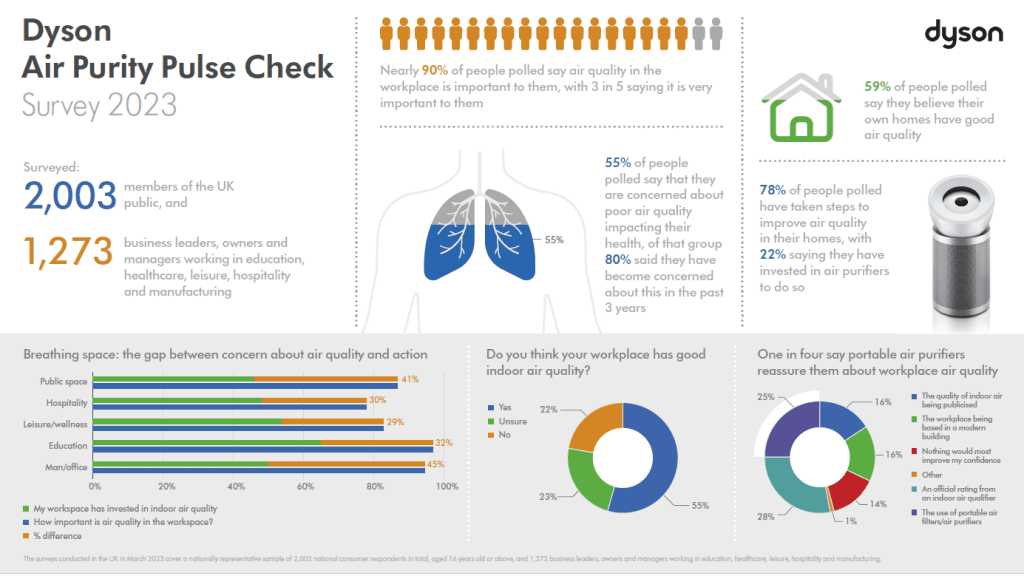- Dyson is launching the ‘Air Purity Pulse Check’ report – a detailed dive into UK attitudes towards the importance of indoor air quality in shared spaces
- Almost half of people polled think indoor air quality is more important than outdoor air quality
- 90% of the UK public say that air quality in the workplace is important
Today, Dyson is launching the ‘Air Purity Pulse Check’ report, a detailed dive into UK attitudes towards the importance of indoor air quality. This in-depth study delves into the views of the public and business leaders, owners and managers on the problem of indoor air pollution.
Poor air quality is a worldwide issue and is recognised by the UK government as ‘the largest environmental risk to public health in the UK’. The Air Purity Pulse Check found that over half of people polled are concerned about poor air quality impacting health, yet only 59% of people polled believe their own homes have good air quality.
A growing consumer concern
The report finds that nearly half (48%) of people polled think indoor air quality is more important than outdoor. Younger, working age respondents are more likely to be more concerned about indoor air quality, with over half (54%) of people between the ages of 25 to 34 years old and 51% of people between the ages 35 to 44 years old saying it concerns them more than outside air quality.
When it comes to poor air quality’s effects on health, the UK public is even more worried: 55% of those surveyed say that they are concerned about poor air quality impacting their health and, of that group, 80% of respondents say they have become more concerned about this in the past three years.
A study by Imperial College London found that 97% of UK homes exceed at least one of the World Health Organisation’s limits on three key air pollutants. People are taking steps with their indoor air quality at home, with 70% of people polled saying they have taken steps such as investing in air purifiers to improve home air quality.
Tim Jones CEng MIET, Lead Research Engineer at Dyson, commented: “Despite indoor air quality being much more prevalent in our lives, people are far more aware of the impacts of poor outdoor air quality. At Dyson, we believe that it’s time to make the invisible visible and the Air Purity Pulse Check report aims to do exactly this.
“The past five years have changed our relationship with air quality, as we spend the majority of our time indoors. In particular, the public r has been made much more aware of the air circulating in their indoor spaces, whether in a shared or private space. Despite its importance, indoor air pollution is largely invisible so has flown under the radar. This in-depth study illustrates the current views and opinions of the public and business owners, creating a ‘pulse check’ on the nation when it comes to indoor air quality.”
Workplace woes
The majority (90%) of UK leaders, managers and owners believe that air quality in the workplace is important. This directly correlates with the public, with 90% saying that air quality in the workplace is important to them as well.
However, there is clearly a mismatch between what is considered important by decision-makers and what actions they are taking: only 65% of managers say that air quality in the workplace is a business priority, and half of people polled say that the organisations they work for have invested in indoor air quality.
The findings demonstrate that indoor air quality should be a business priority to aid staff wellbeing and retention. Two thirds (66%) of people polled said they would be uncomfortable working somewhere with poor air quality and nearly half (46%) said air quality would be a consideration when deciding to take a job.
Hospitality Data
The report showcases that air quality is hugely important to nearly two thirds of pub goers and more than half of consumers polled would consider air quality when choosing a venue (54%), which rises to three fifths (61%) in people aged between 25 to 34 years old.
Indeed, the same amount (54%) of respondents say that an official rating from a specialist indoor air quality evaluator or air purifiers would improve their confidence in the air quality at pubs, clubs and restaurants.
Despite this, hospitality managers do not place the same value on air quality as its patrons: 79% of hospitality managers say air quality is important to them, which is the lowest percentage of any sector measured.
Only half (48%) of hospitality managers polled said their businesses have already invested in air quality at their establishments, with more than half of hospitality managers responding that their business plans to invest in air quality in the future.
Gyms & Spas Data
Air quality is important in all indoor environments and this is especially true in the health and wellness sector. The majority (84%) of health and wellness managers think that air quality is an important consideration for their businesses. In fact, poor air quality could make over half (55%) of respondents swap gyms.
Despite this, only 55% of gym and spa managers say their venues have invested in air quality, pointing to a gap between attitudes and action.
Air purifiers and official ratings from independent air quality evaluators are most likely to increase visitor confidence in air quality at gyms and spas, chosen by 25% and 31% of respondents respectively.
Healthcare Sector
It is of no surprise that of the UK managers asked whether air quality is important to them in the workplace, the health sector managers came out on top (97%). Almost all (94%) health sector managers polled responded that air quality is a growing concern for them.
The importance placed on air quality is translated to the public as well: 89% of people polled say that air quality is important to them when it comes to hospitals and other health facilities. This correlates positively with age, scoring 76% with 16 to 24 year olds and 95% with those aged over 55 years old.
Education Sector
It is vital for air quality to be prioritised in educational environments to ensure they are providing the best learning environment for those within them. The majority of consumers of education (87%) and education leaders (98%) surveyed believe that air quality is important in education spaces.
Encouragingly, 78% of managers in education polled said their employers prioritise air quality which is the most of any sector polled. As well as this, two thirds of managers in education say the organisations they work for have already invested in clean air, the highest of any sector surveyed.
Conclusion
The report paints a clear picture that the awareness and importance placed on indoor air quality issues are moving in the right direction. However, there is still a long way to go to ensure the nation is putting air purity first.
Dyson remains committed to creating cleaner indoor air. This follows the launch of Dyson’s latest model, Big+Quiet Formaldehyde, earlier this year. Engineered with shared indoor spaces in mind, it purifies rooms up to 100m² evenly and fitted with filtration systems that remove 99.95% of pollutants.
Read the full Air Purity Pulse Check report on Dyson’s website: Here

Building, Design & Construction Magazine | The Choice of Industry Professionals





